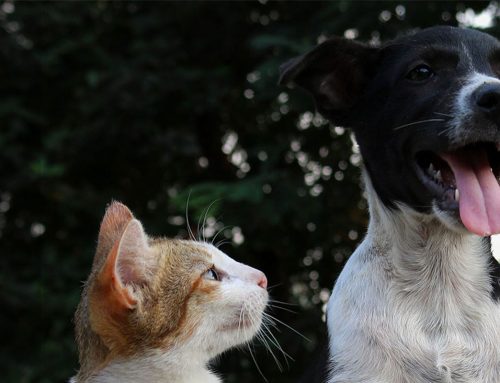Osteoarthritis, also commonly known as degenerative joint disease or arthritis, is a condition that commonly affects our older feline and canine friends and can have a serious impact on their quality of life. Some of the common signs to look out for include stiffness and soreness, difficulty walking, pain, lameness, reluctance to get up or lie down, and difficulty climbing stairs.
Although these signs and symptoms are very uncomfortable for our pets, diagnosis allows for a multimodal approach to manage the condition. Osteoarthritis is commonly diagnosed based on a clinical history and physical exam, though X-Rays are also useful to determine the extent of arthritis present.
How Does Osteoarthritis Develop?
Pets with osteoarthritis often become stuck in a vicious cycle of deterioration which begins with damage to the cartilage lining joints, causing joint inflammation and pain. Inflammation within the joint leads to further damage to the cartilage, whilst the pain causes a reluctance to walk and exercise. As a result of inactivity, many pets experience muscle wastage which leads to less support for joints and more pain. From here, the cycle continues and osteoarthritis worsens gradually with time.
How can we manage Osteoarthritis?
Management of osteoarthritis is multimodal; we combine several treatments to address different factors that contribute to the vicious cycle.
- Anti-inflammatories (NSAIDs): these are prescribed to minimise joint inflammation as well as for pain relief. We recommend routine 6-12 monthly blood testing to monitor kidney and liver function if your pet is started on long-term medications. If your pet develops any adverse reactions after beginning medication, please contact us immediately. We may prescribe alternative medications for pain relief if your pet is not a good candidate for NSAID therapy.
- Synovan Injection: these injections provide cartilage precursors for the body to maintain joint cartilage health. By improving joint cartilage health, we can minimise joint pain and inflammation. Treatment involves a series of 4 injections given at 1 week intervals, followed by a booster at roughly 6 months.
- Joint Guard: this is an oral supplement that contains Chondroitin Sulfate and Glucosamine. Chondroitin is a sulphated glycosaminoglycan (GAG) with many benefits to joint health. Chondroitin has been shown to have anti-inflammatory activity, stimulate production of hyaluronic acid for joint lubrication, as well as reduce cartilage breakdown.
- Fish Oils: Fish oils containing Omega-3 and Omega-6 Fatty Acids are beneficial for arthritic pets due to their natural anti-inflammatory actions. Please use a veterinary-grade fish oil product, as human-grade products have a different ratio of Omega 3 and Omega 6 Fatty Acids to those required in animals.
- Prescription Joint Diet: Royal Canin produce prescription diets specially formulated for arthritic pets. These diet contain various ingredients such as eicosapentaenoic acid (EPA), glucosamine, chondroitin, and antioxidants that work synergistically to reduce joint pain and inflammation.
- Weight Management: weight loss for obese patients is a crucial aspect to managing osteoarthritis, as excess weight leads to increased load bearing on the joint and pain. Royal Canin Satiety and mobility C2P+ is the best option for these pets; please talk to your vet for more information.
- Exercise Moderation and Physiotherapy: a moderate amount of low-impact exercises such as swimming and leash walking are recommended for your pet. This is important to maintain muscle tone to provide mechanical support to joints. Physiotherapy is also available in the form of underwater treadmills. Be careful not to over-exercise your pet as this may exacerbate and worsen osteoarthritis.




